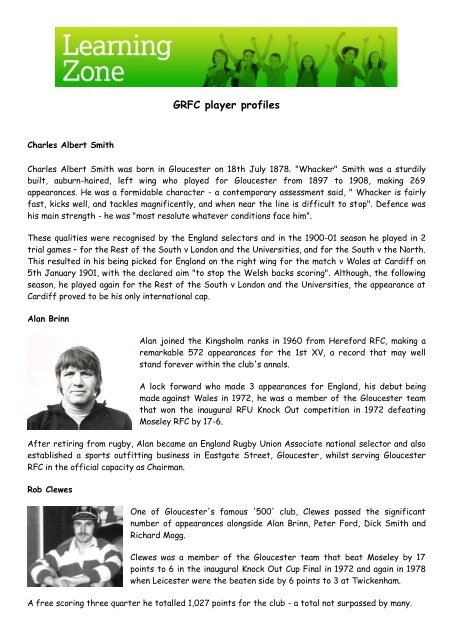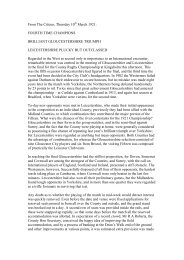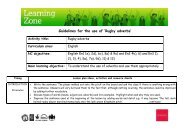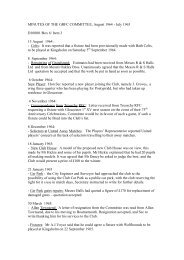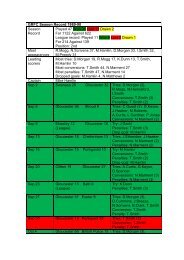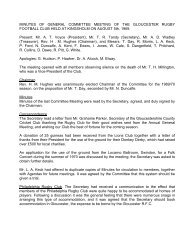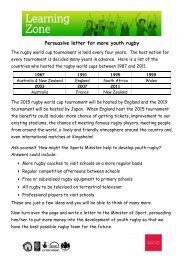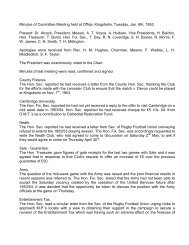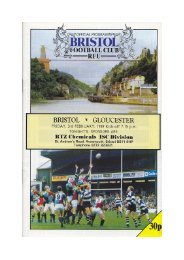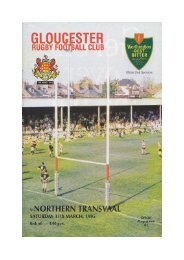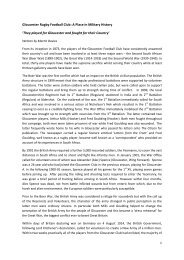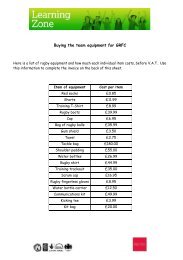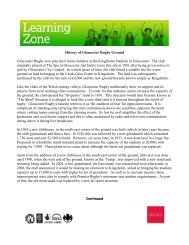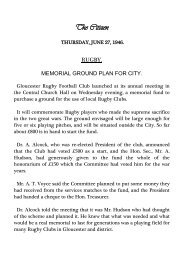GRFC player profiles - Gloucester Rugby Heritage
GRFC player profiles - Gloucester Rugby Heritage
GRFC player profiles - Gloucester Rugby Heritage
You also want an ePaper? Increase the reach of your titles
YUMPU automatically turns print PDFs into web optimized ePapers that Google loves.
<strong>GRFC</strong> <strong>player</strong> <strong>profiles</strong><br />
Charles Albert Smith<br />
Charles Albert Smith was born in <strong>Gloucester</strong> on 18th July 1878. "Whacker" Smith was a sturdily<br />
built, auburn-haired, left wing who played for <strong>Gloucester</strong> from 1897 to 1908, making 269<br />
appearances. He was a formidable character - a contemporary assessment said, " Whacker is fairly<br />
fast, kicks well, and tackles magnificently, and when near the line is difficult to stop". Defence was<br />
his main strength - he was "most resolute whatever conditions face him".<br />
These qualities were recognised by the England selectors and in the 1900-01 season he played in 2<br />
trial games – for the Rest of the South v London and the Universities, and for the South v the North.<br />
This resulted in his being picked for England on the right wing for the match v Wales at Cardiff on<br />
5th January 1901, with the declared aim "to stop the Welsh backs scoring". Although, the following<br />
season, he played again for the Rest of the South v London and the Universities, the appearance at<br />
Cardiff proved to be his only international cap.<br />
Alan Brinn<br />
Alan joined the Kingsholm ranks in 1960 from Hereford RFC, making a<br />
remarkable 572 appearances for the 1st XV, a record that may well<br />
stand forever within the club's annals.<br />
A lock forward who made 3 appearances for England, his debut being<br />
made against Wales in 1972, he was a member of the <strong>Gloucester</strong> team<br />
that won the inaugural RFU Knock Out competition in 1972 defeating<br />
Moseley RFC by 17-6.<br />
After retiring from rugby, Alan became an England <strong>Rugby</strong> Union Associate national selector and also<br />
established a sports outfitting business in Eastgate Street, <strong>Gloucester</strong>, whilst serving <strong>Gloucester</strong><br />
RFC in the official capacity as Chairman.<br />
Rob Clewes<br />
One of <strong>Gloucester</strong>'s famous '500' club, Clewes passed the significant<br />
number of appearances alongside Alan Brinn, Peter Ford, Dick Smith and<br />
Richard Mogg.<br />
Clewes was a member of the <strong>Gloucester</strong> team that beat Moseley by 17<br />
points to 6 in the inaugural Knock Out Cup Final in 1972 and again in 1978<br />
when Leicester were the beaten side by 6 points to 3 at Twickenham.<br />
A free scoring three quarter he totalled 1,027 points for the club - a total not surpassed by many.
Charlie Dunn<br />
A wing forward who joined <strong>Gloucester</strong> from local club Coney Hill RFC and a renowned character who<br />
was often seen leaving his work at the last minute to rush to Kingsholm to play on Saturday or<br />
Thursday evenings.<br />
Well known in the area having held various occupations which included serving on boats on the River<br />
Severn, a helping hand at <strong>Gloucester</strong> Cattle Market and working for the local Council. Popularly known<br />
as 'Jigger' Dunn.<br />
His career at <strong>Gloucester</strong> spanned five seasons, making 159 appearances and recording 32 tries.<br />
Donald Rutherford<br />
Donald Rutherford OBE was born in Tynemouth on 22 September 1937.<br />
During his early career he played for St Luke's College, RAF, Combined<br />
Services, Percy Park and Northumberland. However he is most closely<br />
associated with <strong>Gloucester</strong> and <strong>Gloucester</strong>shire for whom he played<br />
from 1964 to 1968. He won fourteen caps for England and toured<br />
Australia and New Zealand with the 1966 British Lions. He appeared for<br />
the Barbarians on a number of occasions between 1960 and 1968.<br />
Don Rutherford trained as a physical education teacher at St Luke's<br />
College, Exeter. He did his National Service in the RAF. He played for the RAF and Combined<br />
Services and, while still in the RAF, he had his first England trial in 1958, playing for the Whites<br />
against the Colours (scrum half for the Colours in that trial was Micky Booth).<br />
He had already joined Percy Park RFC and played for the club until 1963. During that time he won his<br />
first four caps for England in the 1960 Five Nations tournament and appeared against South Africa<br />
at Twickenham in January 1961. He played for North East Counties against the All Blacks in January<br />
1964.<br />
At the end of the 1963-64 season Don Rutherford joined <strong>Gloucester</strong>. He made his debut for<br />
<strong>Gloucester</strong>shire in November 1964 and was selected for the first of the 1965 Home Internationals.<br />
He was an ever-present for England in the Five Nations in 1964-65 and 1965-66 and was then<br />
selected to tour Australia and New Zealand with the British Lions. As first choice full back he played<br />
in the only International against Australia but on the New Zealand leg of the tour he broke his arm<br />
playing against Manuwatu and had to be flown home. He played once more for England against New<br />
Zealand in 1967.<br />
Don Rutherford had a very successful season for <strong>Gloucester</strong> and <strong>Gloucester</strong>shire in 1967-68. He<br />
captained the club, playing with remarkable consistency and scoring over 300 points. Then disaster<br />
struck when he broke his arm, again playing for the Barbarians against Newport in April 1968, and he<br />
was advised to retire from the game.<br />
While with <strong>Gloucester</strong>, Don Rutherford introduced a coaching creed that was continued in the<br />
successful years that followed under the captaincy of Dick Smith.<br />
Don Rutherford became Technical Director of the <strong>Rugby</strong> Union in September 1969 - their first-ever<br />
professional appointment. He returned to Kingsholm in October 1973, having assembled an
international team of glittering talent to play <strong>Gloucester</strong> in their centenary game. He was awarded<br />
the OBE in 2000 in recognition of his services to <strong>Rugby</strong>.<br />
Frank Brown<br />
John Frank Brown played for <strong>Gloucester</strong> from 1876 to 1883, and was captain from 1879 to 1883. He<br />
was a splendid and inspiring leader, who built the <strong>Gloucester</strong> side into a formidable team.<br />
His final year as captain, 1882-3, was the club's first unbeaten season. Under his captaincy the<br />
game grew greatly in popularity in <strong>Gloucester</strong>, and it was mainly through his efforts that the club<br />
rose to high national status. This all happened before the formation of <strong>Gloucester</strong> Association<br />
Football Club in 1889, and was therefore instrumental in establishing <strong>Gloucester</strong> as principally a rugby<br />
city, a legacy which persists to this day.<br />
Part of his leadership contribution was to expand rugby into the local community - he organised the<br />
<strong>Gloucester</strong> Post Office and <strong>Gloucester</strong> Thursday teams, and also encouraged the establishment of<br />
parish teams, which were later to prove such an asset in the development of <strong>player</strong>s who would go on<br />
to play for <strong>Gloucester</strong>. Indeed the first 2 working class <strong>player</strong>s, George Coates and Tommy Bagwell,<br />
were recruited into the <strong>Gloucester</strong> team under Frank's captaincy.<br />
In 1884, his huge contribution to the club was marked with the presentation of a testimonial in the<br />
form of a gold watch and chain. £60 was collected for this purpose - it would undoubtedly have been<br />
more but for Frank declining to have collecting boxes placed around the ground - he wanted people to<br />
come forward voluntarily.<br />
Frank Brown was born in Bristol, but his father, a railway foreman, moved the family to <strong>Gloucester</strong><br />
and they lived at 41, Upper Falkner Street. Frank went to the Crypt School, and by the time he<br />
started as a <strong>Gloucester</strong> <strong>player</strong> he was employed as a post office clerk. The qualities which he had<br />
demonstrated on the rugby field served him well in his job as well, and later in life he ended up as<br />
Post Master General in South Africa.<br />
He was a sportsman in many fields. He was captain of <strong>Gloucester</strong> Cricket Club, for whom he was a<br />
demon bowler, and he organised the County Cricket Club, as well as the <strong>Gloucester</strong> Amateur Athletic<br />
Association and Rowing Club, and was Chairman of the Lawn Tennis Club.<br />
Francis Hartley<br />
Francis Hartley is credited with being the prime mover in starting the game of rugby in <strong>Gloucester</strong>,<br />
and he was the first club captain from 1873 to 1875. He came from the city of London where he<br />
captained the Flamingos rugby team.<br />
Francis Hartley, representing the Flamingos at the time, was one of the original committee members<br />
of the rugby football union. It was on 26th January 1871 that he assembled at the Pall Mall<br />
Restaurant in Regent Street, London, with 32 others representing twenty-one London and suburban<br />
football clubs that followed <strong>Rugby</strong> School rules. It was resolved at that meeting that the formation<br />
of a <strong>Rugby</strong> Football Society was desirable and thus the <strong>Rugby</strong> Football Union was formed.<br />
A president, a secretary and treasurer, and a committee of thirteen were elected, to whom was<br />
entrusted the drawing-up of the laws of the game upon the basis of the code in use at <strong>Rugby</strong> School.<br />
Hartley's experience was therefore invaluable to <strong>Gloucester</strong> at the outset.
Harold Boughton<br />
It would not have been unusual to see the former England International full back<br />
playing at Kingsholm on a Saturday afternoon and then, should you have popped on<br />
a bus later that day, to see him once again, as he was a bus driver.<br />
Born 7th September 1910, Harold captained <strong>Gloucester</strong> when they returned to<br />
playing following the end of the Second World War, although it was in the interwar<br />
period that he first came to national recognition. Harold was awarded 3<br />
international caps, making his debut against Wales on 19th January 1935 at<br />
Twickenham. Regarded as a reliable kicker, Harold contributed three penalty<br />
goals and a conversion for England against Ireland on his 2nd international<br />
appearance and is recorded as kicking 401 conversions for <strong>Gloucester</strong>.<br />
J Frank Brown<br />
In 1876, J F Brown succeeded to the captaincy and it was during his seven years tenure of office<br />
that the game made such rapid strides in popularity.<br />
Noted for his inspiring leadership, it was through his efforts the club rose to such pre-eminence in<br />
the rugby world. It was during the time of Brown that the earliest club records have been kept.<br />
In the season of 1876-77 there were eleven matches; six were won, three lost and two drawn.<br />
Principal fixtures were with Hereford, Ross, Rockleaze, Swindon Rangers, Cheltenham Whitecross<br />
and Clifton.<br />
John Bayliss<br />
John G A’Bear<br />
A <strong>player</strong> who suffered a broken neck but went on after this setback to<br />
achieve representative honours when selected for an England 'B' tour to<br />
Romania.<br />
John joined <strong>Gloucester</strong> in 1960 and made 366 1st XV appearances, and<br />
during that time recorded 88 tries.<br />
One of the hardest tackling three-quarters of his time, he represented<br />
<strong>Gloucester</strong>shire, winning the county championship in 1974 against<br />
Lancashire.<br />
A <strong>player</strong> who formed a second row partnership with Roy 'Digger' Morris and was captain for two<br />
seasons prior to the outbreak of the Second World War.<br />
During his captaincy of the 1937-38 season the club recorded 29 wins out of 36 matches. John also<br />
represented <strong>Gloucester</strong>shire when they won the County Championship in the 1936 - 1937 season.
John Gadd<br />
Gadd scored two tries for England against Fiji in a non-cap international and<br />
was a highly regarded No.6 but was unfortunate not to receive a full cap.<br />
The blind side flanker was born in New Zealand, although emigrating to<br />
England in his early years. He was educated at Newent School and<br />
represented Newent RFC and then <strong>Gloucester</strong> Old Boys RFC before joining<br />
<strong>Gloucester</strong> RFC in 1978.<br />
He formed part of a formidable back row which included Mike Teague and<br />
Mike Longstaff, being a <strong>player</strong> who possessed speed and a hard work ethic<br />
that few could match. He appeared in the team which drew 12-12 against Moseley in the John Player<br />
Cup final in 1982 and once again at Twickenham in the Pilkington Cup Final against Bath in 1990.<br />
Additional honours included representing England at U23s and B international level.<br />
Malcolm Preedy<br />
Within the first two seasons of joining <strong>Gloucester</strong>, the loose head<br />
prop alongside his Kingsholm front row colleagues, Phil Blakeway and<br />
Steve Mills had formed the England front row.<br />
Preedy, born 15th September 1960 in <strong>Gloucester</strong>, was educated at<br />
Hucclecote Secondary School and began his rugby playing career at<br />
Longlevens RFC. It was from this club that at the age of 19 he joined<br />
the Kingsholm ranks.<br />
A member of the team that shared the John Player RFU Knock-out<br />
Cup in 1982, sharing the honours with Moseley in a 12-12 draw. Preedy<br />
went on the captain <strong>Gloucester</strong> in the 1986-87 season, when the team<br />
won thirty of their forty-seven matches, accumulating 969 points and conceding 583. During his<br />
career he also represented <strong>Gloucester</strong>shire, the South West Regional Team and England U23s.<br />
Mike Hamlin<br />
Affectionately known as 'Hambo', the fly half was born in <strong>Gloucester</strong> and was educated at Oxstalls<br />
School, joining local club Coney Hill at the age of 16. After a short term at Cheltenham RFC, Hamlin<br />
moved to join <strong>Gloucester</strong> in 1982.<br />
The more than competent fly-half captained his home town club in 1989-90 and 1990-91 and was the<br />
captain that led <strong>Gloucester</strong> out at Twickenham on Saturday 5th May 1990, against Bath in the<br />
Pilkington Cup Final.<br />
Mike won representative honours with the South West regional team and was a member of the<br />
England 'B' touring team to Spain in 1989 playing against Basque Select XV and Spain. Mike made a<br />
total of 281 appearances for <strong>Gloucester</strong>.
Grahame Wilshaw<br />
Grahame Wilshaw Parker OBE was born in <strong>Gloucester</strong> on<br />
February 11, 1912. He was educated at The Crypt School.<br />
His first visit to Kingsholm was for the Jubilee game in<br />
1923. His father was a soccer <strong>player</strong> and during the 1929-<br />
30 season Grahame played football at left back for<br />
<strong>Gloucester</strong> AFC while playing centre threequarter for Crypt<br />
School.<br />
Grahame Parker made his debut both for <strong>Gloucester</strong> United<br />
and for the first team in 1931. He was travelling reserve for<br />
<strong>Gloucester</strong>shire at the 1932 County Championship Final<br />
against Durham at Blaydon (He went on to play 15 times for<br />
the county). He believed that he had played in every<br />
position behind the scrum for <strong>Gloucester</strong> before going up to Cambridge and gaining his first blue in<br />
1932-33.<br />
At Cambridge, he won blues at both <strong>Rugby</strong> (the 1934 side contained ten internationals) and cricket,<br />
scoring 94 against Oxford in 1934 and captaining Cambridge in 1935.<br />
He returned to <strong>Gloucester</strong> at the start of the 1936-37 season, when Harold Boughton was<br />
unavailable, but whenever he stepped up to take a penalty someone in the crowd would shout<br />
"Where's Harold then?"<br />
In 1937-38, now a schoolmaster, he realised that he would never be first choice at full back for<br />
<strong>Gloucester</strong> and played instead for Blackheath. He was selected at full back for England that season<br />
and kicked 24 points in his two internationals (including 15 points on debut - a record). He said he<br />
always regretted that "Blackheath" appeared after his name and not "<strong>Gloucester</strong>" although in fact in<br />
most international records he now appears as a <strong>Gloucester</strong> <strong>player</strong>. He also played for the Barbarians.<br />
Grahame Parker continued to play cricket for <strong>Gloucester</strong>shire and in 1937 made three centuries,<br />
including 210 against Kent at Dover. He became a major in the RASC during the 1939-45 war and was<br />
awarded the military MBE (later upgraded to OBE for his work with cadets at Blundell's School).<br />
He appeared occasionally for <strong>Gloucester</strong>shire after the war and then captained Devon in the Minor<br />
Counties Championship from 1953 until 1956. He became Secretary (Chief Exec) of <strong>Gloucester</strong>shire<br />
CCC in 1968 and later was their first ever Manager. He served as President in 1986 and 1987. On a<br />
visit to Kingsholm in 1970 to watch Western Counties play Fiji, he was greeted on arrival with the cry<br />
"Where's Harold then?" It was as if he had never been away. He died in 1995.
Tom Voyce<br />
Regarded as one of the games greatest back row specialists, he<br />
began his playing career at the local Gordon League club. The flank<br />
forward made 218 appearances for <strong>Gloucester</strong> in which time he<br />
scored 54 tries.<br />
Tom appeared in every match of England's Grand Slam winning teams<br />
of 1921, 1923 and 1924, and also represented the Army and the<br />
Barbarians. Tom was captain of <strong>Gloucester</strong> from 1924-1927 and was a<br />
member of the British touring side to South Africa in 1924.<br />
His career was an amazing achievement because of the serious eye<br />
defect he sustained whilst serving for the <strong>Gloucester</strong>shire Regiment<br />
in World War I. During World War II Tom served as a major in the Royal Army Signal Corp. Away<br />
from the game, he was Chairman of the <strong>Gloucester</strong>shire Playing Fields Association and President of<br />
the St John Ambulance Brigade in the County. Tom became President of the <strong>Rugby</strong> Football Union in<br />
1960 and was awarded the Order of the British Empire two years later. Later he became President of<br />
<strong>Gloucester</strong>, 1970-1978.<br />
On the 1924 tour of South Africa he displayed his remarkable versatility and team qualities as the<br />
utility <strong>player</strong> of the side, playing out of position at full back, centre and wing threequarter as well as<br />
his specialist position of wing forward. He scored eight tries in thirteen games and kicked several<br />
goals. P.K.Albertijn, the South African captain, described him as " the second best wing threequarter<br />
in the British team."<br />
"Since the War no man has fired the admiration of the crowd more than Tom Voyce, and in my<br />
experience I have never seen his equal. No man ever followed the ball throughout the two hard<br />
'forties' so closely as he did, no man ever backed up his centre so closely, or attended his wing so<br />
assiduously as the 'King of <strong>Gloucester</strong>'. I shall always remember his wonderful attempt at a dropped<br />
goal, which would have saved the Twickenham record when Scotland beat England in 1926. He<br />
received a pass short of the half-way line, and ran a few yards forward as if he intended to open up a<br />
movement, but he suddenly paused, steadied himself, and took the most terrific hoof at the ball that<br />
I have ever seen, and only by inches did it fall short of the cross-bar." ( The Theory of Modern<br />
<strong>Rugby</strong> Football", published in 1930, and written by I.M.B. Stewart, Irish international forward and<br />
assistant master at Harrow School )<br />
'The name of Tom Voyce is synonymous with that of <strong>Gloucester</strong>. Think of one and the other springs<br />
to mind. For he was a great <strong>player</strong> from a great club - a wonderful inspiration to any side. Tom had<br />
that personality and mental, competitive outlook that makes up a great <strong>player</strong>; and he was a shining<br />
example to others in that he was determined to put something back into the game for all the pleasure<br />
he had out of it', (Wavell Wakefield, England Captain 1924 - One Hundred Cherry & White Years, pg<br />
91)<br />
Frank Hartley<br />
Frank Hartley was the moving force in the formation of <strong>Gloucester</strong> <strong>Rugby</strong> Club. He was captain of the<br />
club in its first 3 seasons, and a useful half-back, who was notable as a good runner. But his lasting<br />
contributions were as an organiser and as a strong advocate for the game of rugby.
Francis Philip Hartley was born into a prosperous family, and received a private education, which<br />
resulted in his graduation from London University in 1867, and his entry into the legal profession.<br />
Whilst in London he joined the Flamingoes, one of the leading early rugby clubs, founded in 1867,<br />
which played in Battersea Park. He became captain, and represented the Flamingoes at the first<br />
general meeting, which marked the foundation of the <strong>Rugby</strong> Football Union, at the Pall Mall<br />
restaurant, Charing Cross, on 26th January 1871.<br />
This meeting appointed the first RFU committee, and Frank was amongst the 13 selected. They were<br />
charged with organising the game, and in particular with proposing the laws of the game. In December<br />
1871, Frank was also chosen to be a member of the selection committee. Frank thus played a<br />
significant part in establishing the role of the RFU as the premier body in English rugby, and in<br />
determining how the game should be played. This was a subject on which he had firm views - he was<br />
particularly concerned that hacking and tripping should be outlawed.<br />
In 1873, he came to <strong>Gloucester</strong> to work as a solicitor at the law firm, Haines and Riddiford. The<br />
handling game of football had been played for some years in an unorganised fashion in the parks of<br />
<strong>Gloucester</strong>, but Frank soon applied himself to the task of adding some structure, and roped in one of<br />
the partners in his law firm, J P Riddiford to assist. On 15th September, a meeting was called at the<br />
Spread Eagle Hotel to recruit members into a [rugby] football club - about 45 gentlemen attended,<br />
and they appointed Frank Hartley as captain, and J P Riddiford as secretary.<br />
So the <strong>Gloucester</strong> Football Club (as it was known for many years) was born. The first match was<br />
against the College (King's) School on 4th October 1873. Despite <strong>Gloucester</strong> managing to field only 10<br />
against the 15 of the College, <strong>Gloucester</strong>'s weight and experience told to the extent of a victory by 2<br />
goals and 6 tries to nil, with Frank Hartley and J P Riddiford each scoring 3 tries. And thus the great<br />
journey of <strong>Gloucester</strong> RFC was underway.<br />
Frank brought with him the principles on which the RFU was establishing the game nationally, and<br />
with this background, and as captain, he would have been a major influence on the way in which<br />
<strong>Gloucester</strong> sought to play. He influenced their playing skills and techniques, and <strong>Gloucester</strong> soon<br />
acquired a reputation for the "short-passing game".<br />
The club which Frank created was socially exclusive, being drawn only from the middle classes to<br />
which Frank himself belonged. The founding members had strong associations with the church and<br />
<strong>Gloucester</strong> Cricket Club, and included 3 solicitors, 2 corn merchants, and several clerks. This<br />
exclusivity was reinforced by the cost of membership (5/- entrance and 5/- annual fee), by holding<br />
practices and matches on weekdays, and by a 2 black ball system to keep out undesirables. However,<br />
this membership did ensure sound financial and commercial management of the club, which was a<br />
significant factor in the subsequent success of the club.<br />
In February 1876, Frank's old team, the Flamingoes, travelled down from London to take on<br />
<strong>Gloucester</strong>. Financial guarantees were the norm for visiting teams, and this probably accounted for<br />
the fact that this match was the first for which <strong>Gloucester</strong> charged admission. Even in those early<br />
days, the social side of rugby was regarded as important, and Frank would certainly have wanted to<br />
make his old friends and relatives welcome. The match was played on a Saturday, and the post-match<br />
socialising was held at the Ram Inn. It seems to have gone extraordinarily well, if only judged by the<br />
fact that, whilst one of the Flamingoes made it back to London on the Saturday night, the rest of the<br />
team didn't make it home until the following Tuesday.
Frank stood down as captain at the end of the 1875-6 season, when the club presented him with a<br />
gold watch in recognition of his contributions. It was left to his successor as captain, Frank Brown, to<br />
build on Frank's foundations to establish <strong>Gloucester</strong> as one of the most successful clubs in England,<br />
and to start sowing the seeds from which <strong>Gloucester</strong> grew to be a club for all.<br />
Harry Berry<br />
Harry Berry made 137 appearances for <strong>Gloucester</strong> between 1907 and 1912. He started his playing<br />
career as a threequarter, but <strong>Gloucester</strong> moved him into the pack, where he proved to be a fast and<br />
clever forward who particularly shone in the lineout and in loose footwork.<br />
His talents were recognised by the England selectors, and he won 4 caps in 1910 - against Wales and<br />
Ireland at Twickenham, France at the Parc de Princes, and Scotland at Inverleith. He scored a try in<br />
each of the away games. His first international on 15 January 1910 against Wales was also the first<br />
match for England at their new stadium at Twickenham.<br />
Harry was born in <strong>Gloucester</strong> on 8 January 1883, and became a career soldier when he joined up in<br />
1899. He served in South Africa, India, and St Helena, but then returned to his home town, where he<br />
started his playing career with <strong>Gloucester</strong>. He was a tower of strength for the 2 nd Battalion<br />
<strong>Gloucester</strong> Regiment rugby side, which reached the Army final in 1910. He is the only Gloster to gain<br />
international honours whilst a serving soldier, but strangely never played for the Army – he was<br />
debarred because he was an “other rank”.<br />
Corporal Henry Berry, service no. 005711, rejoined the Army at the start of WW1, and was killed in<br />
action in France on 9 May 1915. He is buried in grave MR0022 at Festubert.<br />
Tommy Bagwell<br />
Tommy Bagwell was a mere 5ft 4ins tall and just managed to turn the scales at 10 stones, but that<br />
small frame concealed a determined and gifted outside-half and three quarter, who made a huge<br />
impression on the rugby field. He was recognised as a fitness fanatic, renowned for his tactical<br />
ability, and was very difficult to bring down. But he had a much wider influence on the game in<br />
<strong>Gloucester</strong>, because he was instrumental in demonstrating to the working classes that they could<br />
make it to the top in rugby in the City, and to the middle classes that they could benefit greatly from<br />
an infusion of working class men into the club.<br />
In its early years <strong>Gloucester</strong> was exclusively a middle class club, but those early pioneers did feel<br />
that they had a mission to promote the game, and achieved this by encouraging spectators from all<br />
walks of life, and by encouraging the formation around the city of local clubs. These were often<br />
associated with churches, and it was such a club which brought Tommy Bagwell into playing organised<br />
rugby.<br />
Tommy was born in <strong>Gloucester</strong> in 1860, and lived at 55, Mitre Street. He and his bosom chum, George<br />
Coates, both became labourers at the Wagon Works, and started to play rugby for their local side,<br />
St Luke‟s Red Cross. Tommy‟s first games were in 1879, when he was age 18. Given this platform on<br />
which to perform, the two friends forced themselves by sheer merit into the <strong>Gloucester</strong> team.<br />
Existing members of the <strong>Gloucester</strong> club were concerned that their presence would erode club
values, but Tommy in particular came to be valued as much for his conduct and attitude as for his<br />
formidable playing skills.<br />
In fact, George was the first to break into the <strong>Gloucester</strong> first team in 1881. Tommy was invited to<br />
play for the Colts team that same year, but did not step up to the first team until 1883. He soon<br />
made an impression - on team-mates, opponents and the media. Reports of his early matches speak of<br />
his “collaring and dodging powers”, his explosive hand-off, and that “he knows how to get tries”. He<br />
first played for the Club as a centre three-quarter, but soon took up the outside-half position,<br />
“where he performed brilliantly” and was “a positive delight”.<br />
Very early in his career in 1883, he was selected to play against the first London team to travel to<br />
Kingsholm, a game in which <strong>Gloucester</strong> were particularly keen to perform well. The only score of the<br />
match was a try by Tommy Bagwell – “a marvellous individual effort, in which he zig-zagged practically<br />
through the whole opposition”.<br />
He went on to accomplish many other heroics for <strong>Gloucester</strong> and for the County team.<br />
In 1890, A W Vears, otherwise known as the Commodore from his days in the Navy, and one of the<br />
most respected officers of the club, proposed Tommy as club captain. This met with approval, and so<br />
Tommy became the first working class captain of <strong>Gloucester</strong>. His first season was very successful,<br />
with all but two matches won. This was no flash in the pan - under Tommy‟s leadership, the club<br />
enjoyed some of their most successful seasons.<br />
In October 1891, Tommy was captain of <strong>Gloucester</strong> in the first match played at Kingsholm, when<br />
Burton were defeated 18-0. Although he always conducted himself properly, Tommy had a good sense<br />
of humour and was not shy of expressing an opinion - at the dinner after that first match, he<br />
described that afternoon‟s encounter as “a very pleasant match, which I attribute to the presence of<br />
a good referee [Rowland Hill, Secretary of the RFU], which the Club does not often get, especially in<br />
Wales”. At the AGM at the end of the season he asked that Sydney Starr the club‟s secretary ask<br />
permission of the committee before he applied salt to the Kingsholm pitch (a reference to the reason<br />
why the club were obliged to leave the Spa ground).<br />
By this time the matches against the Welsh clubs were regarded as the most prestigious of the<br />
season. Tommy was always keen to put right a loss and, after defeat in Cardiff in 1891, he was quoted<br />
as saying “wait till we get „em on Kingsholm, we‟ll give „em Taffy-whack”.<br />
At the end of season dinner in 1891, and despite the fact that he had not missed a game for more<br />
than two seasons, Tommy announced that he was ending his playing career with <strong>Gloucester</strong>. He gave<br />
as his reasons that he had been playing for 12 seasons, that his home ties were growing, his<br />
advancing years, and his desire to make way for younger <strong>player</strong>s. “Younger but not better, Tommy”<br />
was the response shouted from the floor. And indeed during the close season he was prevailed upon<br />
to play on, and to remain as captain<br />
However, he retired from the captaincy at the end of the 1891-2 season, when age 32. The<br />
<strong>Gloucester</strong> Amateur Dramatic Club held a series of well-attended benefit performances for him,<br />
which raised over £11. In 1893/4, the Club attempted to organise a financial testimonial for him, but
was advised by the RFU that this would professionalise him. The Club was not well placed to challenge<br />
this ruling, since it was under investigation by the RFU in early 1894 over an illegal <strong>player</strong>, which<br />
resulted in the suspension of the club for a fortnight, and of their captain for the rest of the season,<br />
much to the mortification of the club committee, who then felt obliged to be seen to be squeaky<br />
clean by the RFU.<br />
Tommy played on for <strong>Gloucester</strong> into the 1894-5 season, and on finally retiring from senior rugby, he<br />
played for the local St Catherine‟s side for a while. However, <strong>Gloucester</strong> rugby had become his life<br />
and he soon returned to the club, initially as trainer, and later as baggage and kit man. He was made a<br />
life member of the club, and served on the committee. Although he was never given an administrative<br />
post, he was held up to succeeding generations as the role model for the working man at <strong>Gloucester</strong><br />
<strong>Rugby</strong>.<br />
In summarising Tommy‟s career, that doyen of <strong>Gloucester</strong> rugby journalism, Bill Bailey, wrote: “ a<br />
stickler for training, Bagwell made great sacrifices to keep fit, and what success the veteran<br />
achieved on the field he attributed largely to this fact”, “he was a most difficult <strong>player</strong> to check<br />
when on the run, for he possessed remarkable dodging powers, and was up to every move in the game”,<br />
and he had a “specialty hand-off, which opponents, after one experience, took every precaution to<br />
avoid”. Tommy died in 1943 after 60 years‟ association with the <strong>Gloucester</strong> club.<br />
Ian Smith<br />
Born 16th March 1963 and educated at Sir Thomas Rich's School,<br />
<strong>Gloucester</strong>, Ian joined the Kingsholm ranks after moving from local club<br />
Longlevens RFC.<br />
The open side flanker captained <strong>Gloucester</strong> in 1991-92, 92-93 and 93-94<br />
during which time he also gained a regular place in the Scottish international<br />
team. His grandparents were Scots, therefore enabling him to be eligible for<br />
Scotland.<br />
Making his international debut against England at Murrayfield in 1992 and<br />
gaining further honours as a representative in the Scottish World Cup Squad<br />
of 1995, he made 25 international appearances in total.<br />
John Watkins<br />
An outstanding wing forward who, at a mere 14 stones, also packed down<br />
for his Country at tight head. This memorable moment occurred when<br />
Stack Stevens had to leave the field with an injury during a tour of<br />
South Africa.<br />
Born 28th November 1946 in <strong>Gloucester</strong>, John was educated at Linden<br />
Secondary Modern School and played for local club Gordon League<br />
before moving to Kingsholm.
John went on to make 386 1st XV appearances for <strong>Gloucester</strong> scoring 104 tries and appeared in the<br />
XV that won the RFU National Cup Competition in 1972 beating Moseley at Twickenham.<br />
A seven times England international, Barbarian and member of the <strong>Gloucester</strong>shire County ream that<br />
won the championship in 1974, 1975 and 1976.<br />
Mickey Booth<br />
During his distinguished career Booth was regarded by many as the best<br />
scrum half of his era and a favourite with the press who often referred to<br />
him as 'the general‟.<br />
He made 471 appearances for <strong>Gloucester</strong> and 42 for <strong>Gloucester</strong>shire. He<br />
was club captain for two seasons - 1964-65 and 1965-66 - before going on to<br />
be a club committee member, club 1st XV coach, South West regional selector<br />
and member of the England management team for a period.<br />
bowls club.<br />
Educated at Sir Thomas Rich's school and a founder member of Longlevens<br />
RFC, he made his first team debut for <strong>Gloucester</strong> against Oxford University.<br />
Not just a great rugby <strong>player</strong>, Booth was a fair cricketer and also a bowls<br />
<strong>player</strong>, being awarded a county badge and former captain of the Barnwood<br />
Mike Burton<br />
Mike Burton, the tight-head prop, formed one of the most formidable partnerships<br />
with Phil Blakeway that has ever packed down at Kingsholm. Mike was one of a<br />
number of <strong>player</strong>s to be nurtured by local club Longlevens. He made his debut in<br />
1964 versus Moseley, going on to span more than a decade at Kingsholm with 360<br />
appearances. He was a member of the Club's national cup teams who reached the<br />
final in 1972 and 1978; he was capped on 17 occasions by England and was a member<br />
of the British Lions team to tour South Africa in 1974.<br />
Mike Nicholls<br />
A <strong>player</strong> who led quite literally from the front. He captained <strong>Gloucester</strong> for<br />
three seasons, 1970-71, 1971-72 and then again 1973-74.<br />
During the second year of his reign <strong>Gloucester</strong> collected their first ever<br />
domestic trophy, winning the National Knock-Out Cup by defeating Moseley<br />
17-6 in the final at Twickenham.
Mike's career was at a pinnacle in the club's centenary season of 1973-74 when his team recorded a<br />
club record of 39 wins and scored 1000 points. During a playing career that spanned 17 years he made<br />
483 first team appearances and 15 appearances for <strong>Gloucester</strong>shire. Regarded as one of the finest<br />
captains the club has known.<br />
Mike Teague<br />
Nicknamed 'Iron Mike' by the Kingsholm faithful, he played flanker or<br />
number eight, making his debut during the 1977-78 season and soon becoming<br />
one of the most revered and finest back row forwards of his time.<br />
During the 1981-82 season he scored 21 tries. His talent was recognised by<br />
England selectors and he made his debut as a full international for England at<br />
Twickenham on 2nd February 1985 against France. The following year he was<br />
selected for the summer tour to New Zealand.<br />
The Lions tour to Australia in 1989 is generally regarded as his finest hour.<br />
Despite not being selected for the 1st Test due to injury, he was named Man<br />
of the Series for his dynamic and destructive displays in the 2nd and 3rd Tests. He was a member of<br />
England's Grand Slam team of 1991 and played in the World Cup final team that year which narrowly<br />
lost to Australia 12-6 at Twickenham. A total of 291 appearances for <strong>Gloucester</strong> and 22 international<br />
caps.<br />
'He was not just an England international, but an unbeaten British Lion. For greats in cherry and<br />
white, they don't come much greater', (<strong>Gloucester</strong> Citizen, Legends Souvenir Special, 2008)<br />
Peter Butler<br />
'Butler the Boot' was one the most prolific goal kickers to have represented<br />
<strong>Gloucester</strong>. A local lad who used to catch the bus to Kings Square and walk to<br />
Kingsholm. Educated at the local Crypt Grammar School, the almost<br />
mechanical boot of Butler scored an incredible 2,961 points for the club. On<br />
his international debut versus Australia at the Sydney Cricket Ground, 24th<br />
May 1975, he kicked a penalty goal and landed a conversion in a 16 points to 9<br />
defeat. At international level it was a mystery that he never represented<br />
England on more that two occasions. For the <strong>Gloucester</strong>shire County team<br />
Peter scored 367 points in 31 matches, scoring all 24 points in a county cup<br />
final against Richmond. He was a member of the <strong>Gloucester</strong> team that<br />
defeated Leicester 6 points to 3 in the 1978 RFU National Knock-Out<br />
Competition.
Peter Ford<br />
Born 2nd May 1932 and educated at Central Modern School, <strong>Gloucester</strong>,<br />
Peter Ford joined <strong>Gloucester</strong> RFC from Gordon League RFC. A <strong>player</strong> and<br />
man who epitomises the <strong>Gloucester</strong> Club.<br />
There are few who have represented the Club in such a devoted and<br />
faithful capacity as <strong>player</strong> and representative. A captain from 1955 to<br />
1958 with a one year break and then returning to the helm for a further<br />
two seasons.<br />
One of a small number of an elite group of <strong>player</strong>s who have made more<br />
than 500 appearances for <strong>Gloucester</strong>, scoring 146 tries. His debut came<br />
in 1951 after one United game. A frequent trialist and an international<br />
reserve, he was finally capped against Wales at Twickenham in 1964, aged 31, and played in all four<br />
home internationals that season.<br />
He announced his retirement in August 1965 and was playing again in a 9-3 victory over Bristol within<br />
a month of the announcement! Club's leading try scorer in 1954-55. A Barbarian in 1962-3 and<br />
1963-64 and 46 games for <strong>Gloucester</strong>shire (captain in 1963-64)<br />
An unassuming character best illustrated by his reaction to the fact he had been selected for<br />
England. When told the news, it is reported that Peter replied, 'Eh, hang on a minute, say that again!'<br />
A former RFU selector and President of <strong>Gloucester</strong> RFC.<br />
Phil Blakeway<br />
Widely regarded as one of the finest prop forwards to represent<br />
<strong>Gloucester</strong>, Phil commenced his playing career with Cheltenham RFC in<br />
1968 before joining <strong>Gloucester</strong> in 1971. He soon became a familiar figure<br />
in the City of <strong>Gloucester</strong> where he worked for the family business,<br />
wholesale fruit and vegetable merchants. In a career blighted by injury<br />
he played many games for <strong>Gloucester</strong> and was a member of the of the<br />
National Cup final team of 1982. He made 19 international appearances<br />
for England. Playing in an era when Welsh opposition provided the<br />
greatest test, Blakeway recalls one of his finest days was when<br />
<strong>Gloucester</strong> visited Pontypool who had been unbeaten at home for three<br />
seasons; he said, 'we went down and did a job on them. It was a<br />
performance full of pride in the shirt - which was what <strong>Gloucester</strong> were<br />
all about' .
Phil Vickery<br />
Born of farming stock on 14th March 1976 at Kirkhampton,<br />
Cornwall and educated at Bude Haven Secondary School, the<br />
tight head prop carved out a significant rugby career at the<br />
highest level.<br />
He joined <strong>Gloucester</strong> from Bude RFC where he had already<br />
been recognised for his potential having appeared for England<br />
Colts. Philip then graduated through the England ranks from<br />
U16s, U21s and to full England honours, making his debut<br />
against Wales at Twickenham on 21st February 1998.<br />
During his time at <strong>Gloucester</strong> he was awarded three test caps with the British Lions during their tour<br />
of Australia in 2001 and went on to become a World Cup Winner at the Telstra Stadium, Sydney,<br />
Australia, 22nd September 2003, after being part of the team that won an epic match against the<br />
hosts 20-17. Phil was awarded an MBE and was also granted Freedom of <strong>Gloucester</strong> in 2004.<br />
Terry Fanolua<br />
Fanolua was one of the very first overseas <strong>player</strong>s to represent<br />
<strong>Gloucester</strong> alongside Frenchman Phillipe St Andre and Australian Richard<br />
Tombs. Born in Moto'otwa, Samoa he became a cult figure at Kingsholm,<br />
appearing in every position across the club's back line apart from scrumhalf,<br />
making 215 1st XV appearances and scoring 51 tries.<br />
The highlight of his career at Kingsholm came in 2003 when the team<br />
defeated Northampton in the EDF Cup Final at Twickenham. Fanolua was a member of the 1999 and<br />
2003 Samoan International World Cup squads and made a total 29 international appearances for his<br />
Country between 1996 and 2005.


